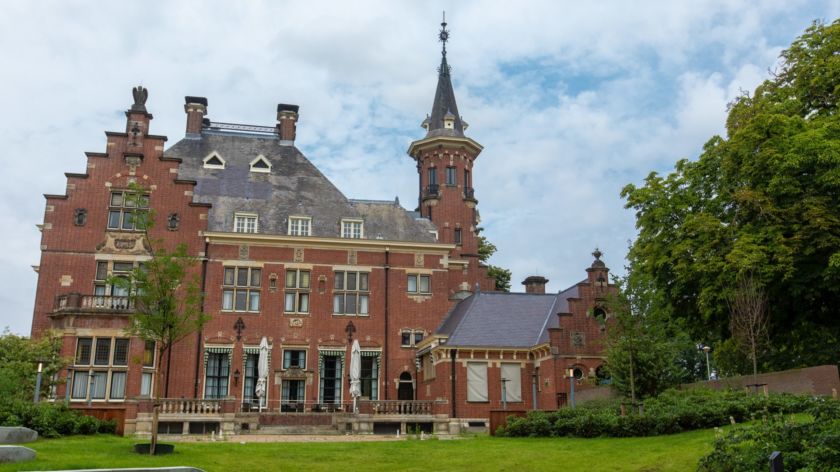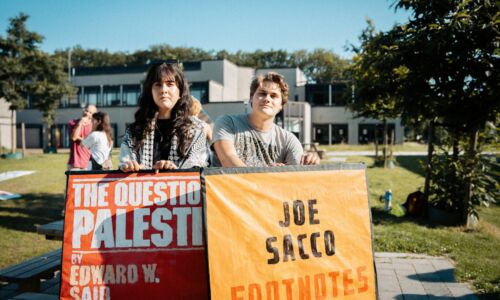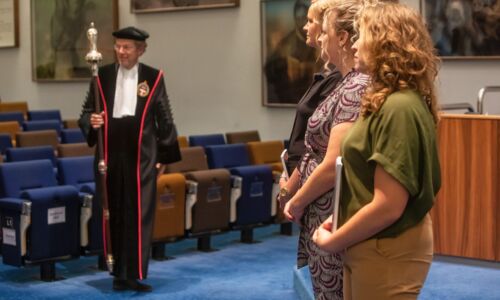‘Cosy and informal’ or actually ‘too soft’? Students and employee brainstorm about the university’s new identity
-
 Huize Heyendael. Foto: Dick van Aalst
Huize Heyendael. Foto: Dick van Aalst
Over the course of eleven dialogue sessions, students and employees talk about the identity of Radboud University. Vox attended one of these sessions in Huize Heyendaal. ‘There are a hundred nationalities in Nijmegen, but you can’t tell that from the university.’
A Wednesday afternoon in Huize Heyendaal. In the majestic Marijnen room – decorated with impressive panelling, stained glass windows and a small library – the tables are set up in a square shape.
‘When you think of the identity of Radboud University, what word comes to mind?,’ conversational leader Anouta de Groot of Radboud Reflects asks ten employees and two students who will engage in a dialogue with each other here for the next two hours. The words that are offered – pseudo-progressive, bonding, human scales, togetherness, under construction, and so on – she writes down in her notebook using a black marker.
Core values
The dialogue session takes place one-and-a-half years after the Dutch bishops retracted Radboud University’s catholic designation, after a lengthy conflict between the supervisory authority of the university and the Radboudumc.
An employee of Vox was allowed to join a session, provided that the participants would remain anonymous. This was to not disturb the dynamics of the conversation.
‘What kind of university do we want to be, keeping in mind where we came from?’
Radboud University is still a special university (see box below article, ed.). To prepare for the centenary in 2023, the university now wants to find out how to give this status substance. The dialogue sessions are part of this research. In total eleven sessions will be held: nine in Dutch, and two in English.
Rector Han van Krieken said to Vox that at least two questions should be addressed during the sessions. ‘What kind of university do we want to be, keeping in mind where we came from and our core values ‘bonding’, ‘curiosity’, and ‘reflective’? And how do we give substance to our special status?
To prepare, all participants receive two texts: the mission of the university and the book ‘A small history of Radboud University’ by historian Jan Brabers, in which five important moments in the history of the university are highlighted.
Personal touch
At least the participants of this session did not sacrifice their lunch break just to praise Radboud University. ‘I always thought Radboud University was ahead of the game when it come to anti-racism, but the universities of Amsterdam and Utrecht are much further along,’ says a student. ‘We call ourselves emancipating, but we have a long way to go.’
An employee notices that the appreciation of education in regard to research is still behind. And that it is hard to keep a personal touch with students if the numbers keep increasing so drastically.
A little while later, the conversational leader asks the participants what the distinctive character of the university is. ‘At the other universities I worked at, faculties are loose entities,’ a professor says. ‘Here, as an employee or student, you are part of the bigger picture. That makes it that you feel more noticed.’
Slow decision-making
When it comes to emancipation, the university has always done a good job, someone remarks. It’s not a coincidence that a first-generation student is among the participants (who is the first of their family to attend university, ed.). ‘I had to explain to my parents what the difference is between a bachelor’s and a master’s study,’ she says. Still, Radboud University can use another boost when it comes to emancipation: the university is still predominantly white. ‘There are a hundred nationalities in Nijmegen, but you can’t tell that from the university,’ an employee remarks.
‘Who really wants to make an impact, needs to make tough decisions’
The accessible, informal, and cosy character of the university, the participants see as an asset. But the fact everything is organised from the bottom up, also has disadvantages. ‘Are we not a little too soft to each other?,’ someone asks. Decision-making sometimes takes ages. ‘Who really wants to make an impact,’ someone says, referring to the title of the university’s strategy, ‘needs to make tough decisions.’
Feedback
Noticeably absent during the conversation is the catholic character of the university. ‘We have talked about a lot of subjects during the last two hours, but sadly that was not one of them,’ De Groot remarks at the end of the session. Afterwards, she writes an anonymised report of the dialogue session, meant for the identity commission and the board of Radboud University.
The input during the dialogue sessions is used in different ways. The mission of the university is basically set in stone, but small adjustments based on the dialogue sessions are possible, says the conversational leader. The dialogue sessions will be reflected on during the Academic Affairs meeting on Wednesday, April 13. Next academic year, when the university’s centenary is celebrated, a special edition of Radboud Magazine will be published, containing interviews with students and employees about the identity of the university.
Private university
Even though it is no longer catholic, Radboud University is still a so-called ‘special’ university. That’s because – different from other universities – it is a private organisation, namely a foundation. State universities, once founded by the government, are legally speaking public by nature. The supervisory authority of state universities is assigned by the government. That is not the case at special universities such as Tilburg University, the Vrije Universiteit Amsterdam, and Radboud University. Members of the supervisory board at Radboud University were until one-and-a-half years ago assigned by the Dutch Bishops’ Conference after they were presented by members of the Catholic University Foundation. This is now done by active members of the supervisory board, and one member is presented by the participation council. A special university also has different rules for the participation council, such as a different voting ratio between students and employees.



